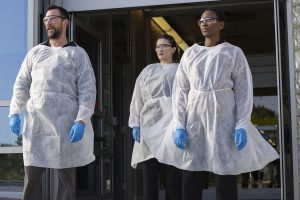
(l-r) Robby (Noah Wyle), Santos (Isa Briones) and Collins (Tracy Ifeachor) and wait for an incoming helicopter, awkward. ©Max CR: Warrick Page/MAX.
BY JUDY SLAONE
Front Row Features
HOLLYWOOD, CA-NBC’s iconic series “ER” ran for 15 years from September 19, 1994 to April 2, 2009. In it, Noah Wyle portrayed John Carter, a medical student; he was also the youngest member of the cast. Now, 16 years later, the actor is putting on his scrubs again and is back in the ER for Max’s new 15 hour drama “The Pitt.” Set in a modern-day hospital in Pittsburgh, Wyle plays Dr. Michael “Robby” Rabinavitch. The show spotlights one 15-hour shift in an emergency room – each hour episode shot like the series “24,” in real time. The drama reunites the “ER” team of Executive Producer John Wells, writer and Executive Producer R. Scott Gemmill along with Noah Wyle, who also has Executive Producer and writer credits on the show.
The series debuted on January 9th, 2025, as one of the top five most watched Max original series ever, globally and domestically.
Noah Wyle and John Wells spoke with journalists about the unique challenge of bringing the ER to viewers in a strikingly new way.
Q: How did this project come about?
Noah Wyle: The pandemic changed everything. I was getting a lot of mail from first responders, that was also confessional about how difficult their daily lives were and who was getting sick and who was getting treated. And I [said] to John, “There’s something happening here that’s probably worth talking about again.” Then we all had lunch and got scared of the idea and went away and came back together a year later and had to wait because there was 192 days [of] labor strikes. Then we got together again and here we are.
Q: How much rehearsal was done before you began shooting?
Noah Wyle: We showed up two weeks early to start medical boot camp on Stage 16, I think it was, which looks out across at Stage 11 where we’d spent 15 years of our [lives,] and that 200 feet felt like 200 years. It felt like a thousand miles. It’s really heady. It’s been rewarding to come back and get to play in this arena again. One of the most gratifying aspects has been working with this ensemble and watching them go through this for the first time, but to be able to be available to them as a resource if they want.
Q: Does the fact that this show is on a streaming platform allow you to do more than if it was on traditional broadcast TV?
John Wells: We’re able to actually show what these incredible physicians and nurses do all day long. We’re trying to make it feel as if you’re right on the shoulder of someone. It’s the version of a ride- along, but with emergency room personnel. Moment after moment you are experiencing what is for most everyone else one of the worst moments of their lives. You’re sitting in an emergency waiting room for eight hours and you don’t understand why you’re still there, why can’t this be better? We’re trying to say this is what these people are doing back there. And we can do that on streaming because we can show the procedures. There’s a tremendous amount of medical nudity in it, but none of it is salacious. It’s just, here are these people who are dealing all day long with these very traumatic experiences. This always sounds cliche, but they really are heroes, what they do every day, and the difference they make in our lives.
Q: Noah, I know you’re not John Carter in this, but your character is as likable as Carter. Did you find yourself saying, ‘That feels like Carter. I’ve got to push back from that?”
Noah Wyle: No, this is a totally different acting exercise. This is building a pressure cooker hour by hour, degree by degree, playing with levels of fatigue and an ability to compartmentalize things that need to be compartmentalized. This has been a wonderful psychological examination of one guy having one of the worst days of his life and the presence required in just that exercise. I haven’t even thought about similarities or differences to the other character.
Q: You’re not just the actor in this; you’re also a writer on the show. How interesting is that muscle to exercise?
Noah Wyle: One of the most gratifying things I’ve been involved with in my whole career was getting to be in the writing room with Scott and these incredible writers and learn, at this caliber, how the sausage gets made and how thoughtfully these things are put together.
Q: Did sense memory come back easily?
Noah Wyle: It was so crazy putting [these scrubs] on the first time. It’s like I have a groove in the back of my neck that just clicks into place. It’s uncanny. It would be rare for another actor to have an opportunity to revisit something that was such a huge part of their early career, and that was so ingrained in their tissues, and then get to play that instrument again with a little wisdom and maturity and hear the tone and how it’s changed over the years. It’s been really rewarding.
Q: Given the early success you’re having with this, might you do another season like “24” used to do?
John Wells: It’s relatively early still in our run. We’ve only had four episodes on the air so far, and it would be very unusual to hear this early. But we’re all hopeful and want to spend more time with these characters. It’s about the stories and the characters. These are wonderful characters. I’d be as interested as an audience member to see what else there is to learn about these people.




